
YouTube Video
Click to view this content.
A comedy released in the spring, so somewhat old news.
From the movie's website:
>Coffee Wars is committed to the health of the planet and the welfare of its occupants. The film is produced by VegGood Films, which invests in entertainment that supports human rights, civil rights, animal rights, and the preservation of the planet that is our host. > >All of the products used in the film are ethically sourced and vegan, including all "milk" and brands used in wardrobe, hair, and makeup. All animals featured in the film were rescued by the production team and are living happy lives at animal sanctuaries. > >VegGood Films has announced that 100% of all proceeds from the film will be donated to environmental and animal welfare charities.
Tropes of ‘effeminized’ masculinity have long been bound up with a plant-based diet, dating back to the ‘effeminate rice eater’ stereotype used to justify 19th-century colonialism in Asia to the altright’s use of the term ‘soy boy’ on Twitter and other social media today to call out men they perceiv...
Our Hen House is great! They have such a wide variety of guests doing all types of work around the world.
I was not expecting this topic for Andersen 's next doc. I'm not religious myself, but I'm interested in seeing where they go with it.
Edited to add: interview begins about 00:20:26
What started with the question, “Is there a spiritual way to kill an animal?” has become the newest investigative documentary from Kip Anderson, of Cowspiracy fame, and Kam Waters. Join the journey to discover why so many religions who hold compassion as a sacred tenet turn a blind eye to animal suffering.
Kip Andersen has changed the way the world looks at eating animals. After producing some of Netflix’s most-watched documentaries, Cowspiracy, What The Health, and Seaspiracy, working alongside the likes of Joaquin Phoenix and Leonardo DiCaprio as executive producers, Christspiracy is his biggest chapter yet.
Kam Waters is a former gospel songwriter and musician for Sony and Interscope Records turned filmmaker. After growing up in the bible belt with a family lineage of gospel singers and a minister, Kam was entrenched in the church from the day he was born. It wasn’t until he realized how people use Christianity to justify animal abuse that he started this journey and, eventually, co-created this revolutionary documentary.

YouTube Video
Click to view this content.
pattrice jones is an ecofeminist writer, scholar, activist and co-founder of VINE Sanctuary.
About VINE, from their website:
>VINE is an LGBTQ-led farmed animal sanctuary that works for social and environmental justice as well as for animal liberation.
>We were the first sanctuary to rehabilitate roosters used in cockfighting.
>Our solar-powered sanctuary is driven by an ecofeminist understanding of the intersections among the ways that humans hurt animals, each other, and the environment.
More info: https://vinesanctuary.org/intersections
As the United Nations climate change conference - COP28 - concludes, World Animal Protection Canada acknowledges progress made by countries committing to...
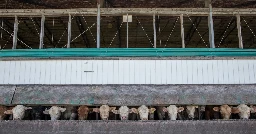
More info: COP28 Declaration on Food and Agriculture
I wish lol. It seems like they hated how vague the slogan is and wanted the right to throw shade:
The promotions issued pursuant to the Beef Act are generic in character - meaning that, among other things, they do not distinguish between the grain-fed U.S. beef produced by respondents and the grass-fed beef produced abroad, which respondents regard as inferior. Respondents object to this simplistic "beef is good" message, which obscures the quality differences between U.S. and foreign beef.
Government speech has the ability to change with every election, the Supreme Court said:
If the citizenry objects, newly elected officials later could espouse some different or contrary position.
But with voters ignoring the issue because their government tells them eggs are incredible and asks them if they got milk? With them choosing not to advertise plant based foods as legitimate alternatives with the same pizzazz?
We're fighting industry messaging fed to us by our government, from our first school lunch all the way to senior meal programs, which serves to funnel money to the big corporations that control the market. The corporations use their money to bankroll politicians for more influence and more funding in the next farm bill. The cycle continues.
No matter what we buy or don't buy, they continue unfazed knowing 40% of food gets thrown away and that many of the animals they breed into existence are destined for the dumpster. They rake in cash regardless because our food system was built by and for corporations.
It's absurd and overwhelming, and it's time Uncle Sam and the Cowboys got a divorce.
In Johanns v. Livestock Marketing Association (2005), the Court, using the government speech doctrine, rejected a First Amendment challenge to a compelled advertising program.
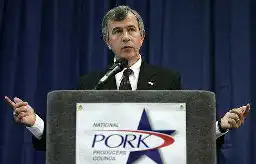
Johanns v. Livestock Marketing Association (2005)
>Writing for the majority, Justice Antonin Scalia reasoned that the government had a First Amendment right to promote its own message regarding beef. “The message set out in the beef promotions is from beginning to end the message established by the Federal Government,” he wrote. “When, as here, the government sets the overall message to be communicated, and approves every word that is disseminated, it is not precluded from relying on the government speech doctrine merely because it solicits assistance from nongovernmental sources in developing specific messages.”
>In the main dissent, Justice David H. Souter, joined by Justices Anthony M. Kennedy and John Paul Stevens, wrote that “if government relies on the government speech doctrine to compel specific groups to fund speech with targeted taxes, it must make itself politically accountable by indicating that the content actually is a government message, not just the statement of one self-interested group the government is currently willing to invest with power.”
More info:
What Farm Subsidies Are and Why They Matter, Explained
The Real Cost of Meat [14:14]
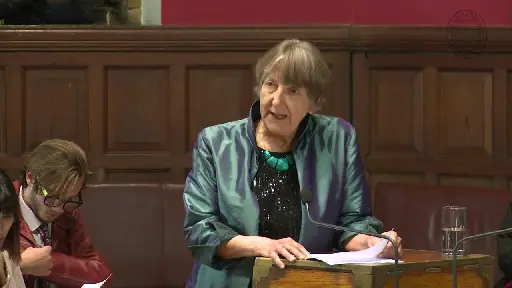
YouTube Video
Click to view this content.
From the description:
In the wake of damning new evidence, the contribution of meat consumption to carbon emissions is at the forefront of global conversations. In this debate, fears of environmental damage and ethical concerns for animal rights clash with millions within the meat industry facing unemployment, religious and cultural traditions being condemned, and those with medical requirements risking disapproval for putting their health first. In light of these competing concerns, we must confront one of the most urgent issues of our time: should society finally move beyond meat?
--------------------------------------
Proposition Speakers
- Heather Mills - Former model, businesswoman, media personality, and activist. She launched VBites, a vegan food company, and plans to create a ‘vegan Silicon Valley’ in the North of England.
- Professor Jeff McMahan - White’s Professor of Moral Philosophy at the University of Oxford and author of The Meat Eaters. He has been a vegetarian for more than 50 years and continues to query the ethics of killing animals.
- Carol Adams - Writer, vegan feminist, and animal rights advocate. She is known for having written The Sexual Politics of Meat: A Feminist-Vegetarian Critical Theory, and was inducted into the Animal Rights Hall of Fame in 2011.
--------------------------------------
Opposition Speakers
- Mikhaila Peterson - Canadian podcaster who runs the blog Don’t Eat That. She eats a meat-only ‘Lion Diet’ and claims this has helped her overcome autoimmune and mood disorders.
- Peter Stevenson OBE - Chief Policy Advisor to Compasssion in World Farming and recipient of the RSPCA Lord Erskine Award. He was lead author of the UN Food and Agriculture Organisation review of animal welfare legislation.
In Theaters! Laemmle Monica Film Center, Santa Monica, CA - October 13 Angelika Village East, New York, NY - October 20 Winner of the Best Feature Documentary…
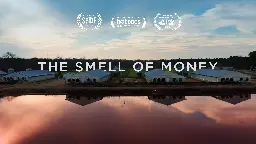
Documentary about Murphy-Brown's (a subsidiary of Smithfield Foods) shitty practices in North Carolina.
Website: https://www.smellofmoneydoc.com/
More info: https://www.vox.com/future-perfect/23003487/north-carolina-hog-pork-bacon-farms-environmental-racism-black-residents-pollution-meat-industry

YouTube Video
Click to view this content.
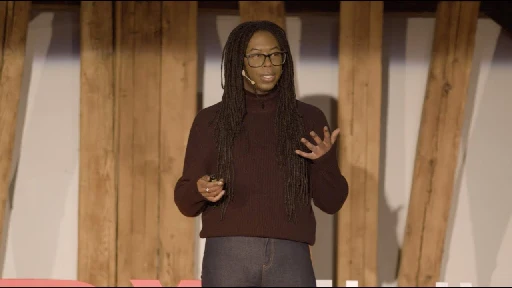
YouTube Video
Click to view this content.
Discussion of racism, slavery, genocide, and cannibalism.

YouTube Video
Click to view this content.
Edited to add the description of the talk written by the lecturer, Syl Ko:
>An ongoing debate in contemporary animal ethics and critical animal studies is whether membership in the species Homo sapiens is morally relevant. Some argue that taking into account the species of a being in moral deliberation is no different than taking into account any other morally arbitrary property of a being, such as their race or sex. (Singer) Others, however, resist the parallels drawn between speciesism and moral injustices such as racism and sexism. They argue that one’s membership in our species is not only a morally relevant fact to consider, but to insist otherwise is to threaten the nature of morality altogether. (Diamond, MacLean, Williams, Anderson)
>In this presentation, I discuss another human-animal division absent from the debate, which concerns members of our species exclusively. This division establishes who is and who is not a “real human” in order to determine a social order in which members of the group “Human” are separate from and superior to the latter group, “Animal,” thus justifiably putting into place practices and institutions that ensure the former group’s dominance over the allegedly inferior others. (Deckha, Fanon, Ko&Ko, Wynter) What is under dispute in this division is not whether the affected individuals or groups are members of our species. Rather, the affected individuals or groups are recipients of inequitable treatment by virtue of their perceived failure to qualify as members of the social class, “Human.”
>I argue that the latter division is, in fact, conceptually prior to the former. Thus, questions concerning the moral status of nonhuman animals ought to move away from discussions concerning species membership and to those concerning topics such as race, gender and class.
